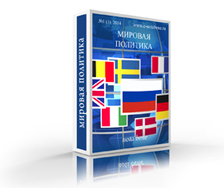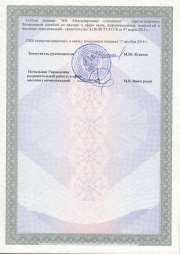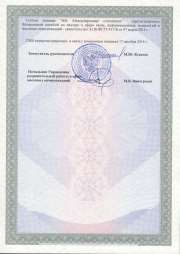MAIN PAGE
> Journal "World Politics"
> Contents of Issue ¹ 04/2022
Contents of Issue ¹ 04/2022
|
Yanikeeva I.O. - Russian-American Relations in the Field of International Information Security
|
|
pp. 1-15
|
DOI: 10.25136/2409-8671.2022.4.38897
EDN: JKNPZX
Abstract: The article provides the results of a study to identify the specifics of Russian-American relations in the field of international information security (IIS) and the potential for its development in the digital environment in the 21st century. The author considers such aspects of the topic as the approach of Russia and the United States in the field of ensuring IIS; Russian-American relations in the field of IIS. Particular attention is paid to the consideration of the specifics of Russian-American relations on IIS issues, as well as to the extent to which they have an impact on modern international security in the period from 1998 to the present. The main conclusion of the study is that the IIS is an important component of bilateral relations between Russia and the United States, and the nature of relations on this issue has an impact on the international system, but it has a certain autonomy being inscribed in a broader geopolitical context. The author's special contribution to the study of the topic is the use of the case study method to identify the role of cyber sanctions within the IIS in general and Russian-American relations in particular. The novelty of the study lies in conducting a comprehensive analysis of the issues of IIS in the context of modern bilateral relations between Russia and the United States and the trends of the international system, including the study of the impact of new information and communication technologies on modern international security and strategic stability.

|
Regional configurations of international relations |
|
Uryupina A.E. - Problems of Implementing the EU's Inter-regional Policy in the Asian Direction
|
|
pp. 16-31
|
DOI: 10.25136/2409-8671.2022.4.38967
EDN: EZSCDV
Abstract: Interregionalism occupies an important place in the foreign policy of the European Union, because through it the EU seeks to expand its presence in various regions of the world and export its norms, views and values. The promising, rapidly developing Asian region is no exception. This article is devoted to the study of the process of building an inter–regional policy by the European Union in the Asian direction, namely with the largest regional association in the region - the Association of Southeast Asian Nations (ASEAN). The purpose of this study is to identify the main factors hindering the building of effective cooperation between the regions, as well as the creation of a free trade zone (FTA). The main conclusion of this study is that there are a number of obstacles to the creation of the EU-ASEAN intercontinental free trade area, which significantly affect the relations between regional groupings. Firstly, it is the practice of concluding bilateral agreements, used as a springboard for the future FTA. Bilateral agreements have already been successfully signed with individual countries, namely Singapore and Vietnam, but contradictions of both an economic and political nature arise with other ASEAN member countries. Secondly, the existing competition with China and the United States for influence in the region hinders the EU's attempts to pursue its inter-regional policy.

|
Rustamova L.R. - Contribution of International Non-Governmental Organizations to Peaceful Conflict Resolution Processes: The Case of the Syrian Conflict
|
|
pp. 32-45
|
DOI: 10.25136/2409-8671.2022.4.38836
EDN: IMDEEC
Abstract: Due to the increase in the number of conflicts, which lead to the growth of tension and destabilization of the system of international relations, the search for new mechanisms for their settlement and new participants who are able to introduce a positive agenda through interaction with all parties is an urgent research task. This paper focuses on international non-governmental organizations (INGOs), acting as such new actors and taking part in the settlement of the conflict in Syria. The purpose of the article is to analyze their contribution to the Syrian peace process, to consider their possibilities and limitations. The methodology is based on discourse analysis and case studies. The case of Syria was chosen because of the ongoing nature of the civil war there, as well as the fact that INGOs have proposed a number of new initiatives to resolve the conflict, which makes this study novel. The study identified the main organizations that propose a peaceful settlement of the conflict, and also identified the main trends in the participation of INGOs in the crisis settlement in Syria. Thus, participating in the peace process, they also implement peacebuilding projects, actively cooperate with local INGOs, and switch to remote work formats due to security problems. However, the analysis of their proposals for the peace process also revealed the main problems of the activities of INGOs within the framework of track II diplomacy, which consist in their neglect of the principle of impartiality. The ability of INGOs to promote their initiatives is also influenced by the dynamics of traditional diplomacy. The key takeaway is that, despite the complexity of the Syrian peace process and the dominant role of traditional diplomacy, INGOs have a significant positive impact on the peace process as they promote grassroots cohesion among the Syrian population and encourage them to form civil associations similar to INGOs, which are also gradually beginning to look for ways of national reconciliation.

|
Theory and methodology of international relations |
|
Yin Q. - MCC as a Tool of American Influence on Developing Countries
|
|
pp. 46-57
|
DOI: 10.25136/2409-8671.2022.4.39171
EDN: JZYPMB
Abstract: In February 2022 there were massive demonstrations in Nepal against the $500 million "free" aid agreement between the country and the Millennium Challenge Corporation (MCC). The protests subsided, and the Nepalese parliament overwhelmingly approved the agreement. In July 2022, civil unrest broke out in Sri Lanka. A member of parliament shot himself, the prime minister's ancestral home was burned down, the defense ministry was forced to issue a "shoot-to-kill" order against protesters, and the president promised not to sign the MCC. In this article, the author explores the MCC as an instrument of American influence in developing countries, using Sri Lanka and Nepal as examples. Particular attention is given to specific mechanisms of economic pressure on developing countries to achieve political results. This article introduces the MCC organization and, by describing events in Nepal and Sri Lanka, reveals the role that the MCC plays in the process of American intervention in the Third World. The study analyzes statistics that illustrate the economic impact of the U.S. on developing countries. The author draws conclusions about the impact of U.S. activities through the MCC on the regional environment. There are many ways in which the United States intervenes in regional affairs. The MCC is only one of them, but it is particularly significant. Through it, the U.S. establishes privileged conditions for itself in negotiations with developing countries to achieve results that could not be obtained without economic pressure.

|
Challenges and threats to international security |
|
Strigunov K.S. - Strategic Risks Hindering Nuclear War Between China and the United States
|
|
pp. 58-87
|
DOI: 10.25136/2409-8671.2022.4.39024
EDN: NWVAMZ
Abstract: The object of the study is a hypothetical nuclear war between China and the United States. The subject of the study is the strategic risks preventing a nuclear war between China and the United States. The aim of the study is to determine the strategic risks that prevent the initiation of a nuclear war between China and the United States at the stage of making a decision to launch a first nuclear strike. Methods and methodology. The study was carried out within the framework of neorealism. A systematic approach was used as well as the methodology of classical military-political studies. Among the methods used were such general scientific methods as analysis, synthesis, induction, deduction. The method of studying documents and the factorial approach were also used. The article analyzes the strategic risks that prevent the unleashing of a nuclear war between powers with the world's largest economies in the context of intensive globalization. The author concludes that the strategic risks of nuclear war outweigh the benefits of it especially in the context of intense globalization. The expectation of a nuclear strike and the mechanism for making a decision about it, in the author's opinion, are one of the most important factors in the low probability of actors to resort to nuclear war as a means of resolving contradictions. At the same time the misinterpretation of damage and the difference in understanding the scale of a nuclear strike also hinders a nuclear war. The novelty of this research. The issue of a hypothetical nuclear war between China and the United States is considered for the first time in scenarios of limited and massive nuclear weapons, simultaneously taking into account the factors of intensive globalization; the «fog of war» effect, which plays an extremely important role; the risk of a distorted interpretation by the attacked of the scale of nuclear strikes; different understanding by the attacker and the attacked of what is considered a limited strike and the risk of a disproportionate response; erasing the boundary between limited and massive nuclear strike in the context of intensive globalization and reducing the level of unacceptable damage; third party factors, incl. state or non-state actors capable of provoking a nuclear escalation.

|
Torosian A. - Conceptual foundations of peacekeeping within the UN
|
|
pp. 88-97
|
DOI: 10.25136/2409-8671.2022.4.38437
EDN: OQZQEN
Abstract: The article discusses the key principles of United Nations peacekeeping. Based on the use of the mechanisms of the Charter of the United Nations, the evolution of the Organization's activities in the field of maintaining international peace and security from the concept of collective security to the modern practice of peacekeeping is shown. Using the example of key documents of the universal Organization and specific United Nations peacekeeping missions, the functioning of the principles of consent of the parties, impartiality and non-use of force, as well as their conceptual changes in the post-bipolar period, is analyzed. The conceptualization of the principles of UN peacekeeping reflects the processes of evolution of the system of international relations in the bipolar and post-bipolar period in general, and the UN in particular. The inability to implement the original ideas laid down in the UN Charter prompted States to develop flexible mechanisms for responding and adapting the Organization to current conditions and moving from the concept of collective security to modern peacekeeping practices; the key principles that laid the foundation for UN peacekeeping operations were gradually formed. Along with the above—mentioned principles — the consent of the parties, impartiality and non-use of force - there are also such fundamental components of the success of peacekeeping operations as general guidance from the founding body, that is, the UN Security Council, as well as the order of management and control over international peacekeeping forces that operate under the leadership of the UN Security Council, but are under the command of the Secretary General. a secretary who speaks on behalf of the UN and has political guidelines from the Security Council.

|
International image of the state |
|
Zeleneva I.V., Terekhov M.S. - The influence of the Olympic Games on the formation of the image of Russia
|
|
pp. 98-108
|
DOI: 10.25136/2409-8671.2022.4.38609
EDN: NVCQFN
Abstract: In recent years, Russia has been paying great attention to the Olympic Games. The Olympic Movement plays an important role in shaping the country's foreign policy image and promoting national interests. The purpose of this article is to determine what impact the Olympic Games have on the formation of the image of the Russian Federation. The main stages of Russia's participation in the Olympic Games in 1994-2022, forming the image of the country, are highlighted. The study showed that the first two stages, including the period from 1994 to 2012 and the 2014 Olympic Games in Sochi, were extremely successful in forming a positive image of Russia, which was constructed thanks to the successes of Russian athletes, the construction of a "Russian House" in Olympic parks, the opening and closing ceremonies at the Sochi Olympics, as well as the Sochi 2014 Cultural Olympiad project. The image of Russia as a great sports power was strengthened. However, Russia's participation in the Olympics from 2016 to 2022 was not so successful and affected the image of our country. The deterioration of the image was caused by various doping scandals related to Russian athletes. The authors came to the conclusion that the Olympic Games from 1994 to 2012 and the Olympic Games in Sochi – 2014, which we refer to the first two stages, had a steady positive effect on the image of Russia. However, the negative factors that have arisen since 2016 partially offset the successes achieved in this direction in previous years. Due to the current geopolitical situation, holding another Olympic Games in Russia is not expected in the foreseeable future, so at the moment the best option is to focus on the development of sports within the country. Also, to create a positive image of Russia, it is important to revive the practice of creating a "Russian House" in Olympic parks.

|






